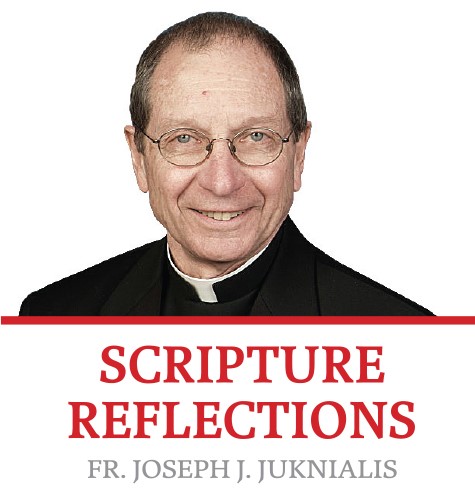FIFTH SUNDAY OF LENT
Ezekiel 37:12-14
Romans 8:8-11
John 11:1-45
FR. JOE JUKNIALIS
One morning you might wake up
to realize that the knot in your stomach
had loosened itself and slipped away,
and that the pit of unfilled longing in your heart
had gradually, and without your really noticing,
been filled in – patched like a pothole, not quite
the same as it was, but good enough.
And in that moment it might occur to you
that your life, though not the way
you planned it, and maybe not even entirely
the way you wanted it, is nonetheless –
persistently, abundantly, miraculously –
exactly what it is.
by Lynn Ungar
Life is not without moments when we feel overwhelmed, at times even buried in tombs not of our own carving. An unwanted divorce, the premature death of a loved one, loneliness and its oft accompanying twin of self-pity, deflated dreams no longer buoyed by hope, perhaps even sinfulness long past that continues to scratch and claw at our psyches – all of these can give us the feeling of life having been sapped from our very core. That sense of being buried by the events of life, then, occurs long before our final breath, and perhaps more than once over the course of our lives.
So then how is it, as the poet points out, that we find our lives pulsing with new rhythms when all we previously had heard was the drumbeat of what seemed a death march? From whence comes the unexpected realization that there is more life to live when we thought it had all been used up?
Always there is a voice that seems to call us out of those tombs in which we find ourselves buried. Like the morning chorus of birdsong that calls each new day into being even before that day’s darkness has begun to be undone, there is a voice, an insistent one, that urges us into beginning again when we have felt there is little that awaits us. It is the voice of our God, for “thus says the Lord God: O my people, I will open your graves and have you rise from them … then you shall know that I am the Lord.” Ezekiel 37:12-13
The old man lives alone now. His wife is gone, and his children live lives of their own. In his quiet, he makes his way from room to room, stopping at each window and always finding himself gazing out into his own emptiness, wondering how it is that his life has slipped by without ever being noticed. Years have drained his world until only the dregs that have settled look back from the bottle that once seemed so filled with life. Then one day, for some reason he does not understand, he decides to move to the other side of the windows and live again the life he once knew. He chooses to journey out rather than in. Always there is that voice that calls us out of our tombs.
Like Lazarus, who was called out of his tomb, it is not a new life to which we return but rather the one we’ve been living all along, the one with its hurts and leftover pains that seem to be so unshakeable but also the one with all that has made it worthwhile. It is the life we’ve been given, for after all there is no other. It is also one, however, with new breath, new spirit, that somehow enlivens us. It is old but also new.
While the poet that began this piece doesn’t name the why or how of such a movement in life, the person of faith does. As it was with Lazarus, so also with us. It is the voice of our God who calls us to come out, to be unbound, to be let go. At times, we recognize that voice and from whence it comes, and at other times we simply move on into life. We say that it comes like a breath of fresh air. In reality, it is always the breath of God once breathed into us at the very beginning and so ever since.
And if all of this is so, time and time again, then it must also be so when at last we do take our final breath and enter into what seems to us now to be such dreaded darkness. Then that same voice must be there waiting to call us out of that tomb and into an abundance of life – life that is both old but also very new.
REFLECTION QUESTIONS
When have you felt hopelessly in the dark only to find yourself brought into new life?
How might this be a parallel to your faith of sharing in the resurrection?
